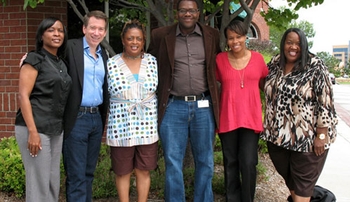The statistics are heartbreaking, but undeniable.
According to www.douglascohealth.org, for 2010, the infant mortality rate for African Americans in Douglas County was 17.6 per 1,000 births, as compared to 2.7 per 1,000 for Hispanics, and 4.8 per 1,000 for White/Hon-Hispanic individuals. The U.S. Department of Health and Human Services’ target infant mortality goal is six per 1,000.
 |
The Connections Project leadership team includes, from left, Gail Ross, UNMC’s Jack Turman Jr., Ph.D., Thelma Sims, Steve Jackson of the Douglas County Health Department, UNMC postdoctoral researcher Kellee Hanigan, D.P.T., and Kathy Trotter. |
“This is all being done in partnership with community, not on community,” Dr. Turman said. “Women and families that have experienced adverse birth outcomes are going to have the most insight into the conditions surrounding adverse outcomes and be the best at determining effective solutions to address these conditions.”
Importance of environment
A neuroscientist who studied environments conducive for healthy infant brain and behavior development, Dr. Turman partners with women in the community to find solutions.
Gail Ross is one of the project’s three Community Health Advocacy Leaders. She was born, raised, lives, and now raises her children in North Omaha.
“With the Connections Project, the focus is on thriving,” Ross said.
Bolstered support
The most well-known aspect of the Connections Project is the pregnancy peer support program. Up to 20 pregnant mothers are trained as peer supporters and then matched with fellow North Omaha women. Their role is to provide the pregnant women with additional emotional and informational support.
“By providing this additional support, peer supporters help keep stress at the minimum and promote healthy pregnancies,” Ross said. “We want both mom and baby to thrive.”
A crucial start
The project’s next phase is to improve early-learning cognitive development in the babies from ages 3 to 12 months; a time when the brain is developing critical circuits for learning and memory.
Mothers and infants will be enrolled in a program that fosters maternal-infant interaction that promotes early language development.